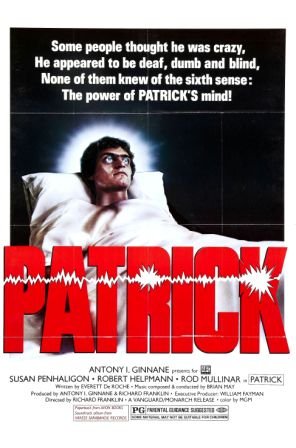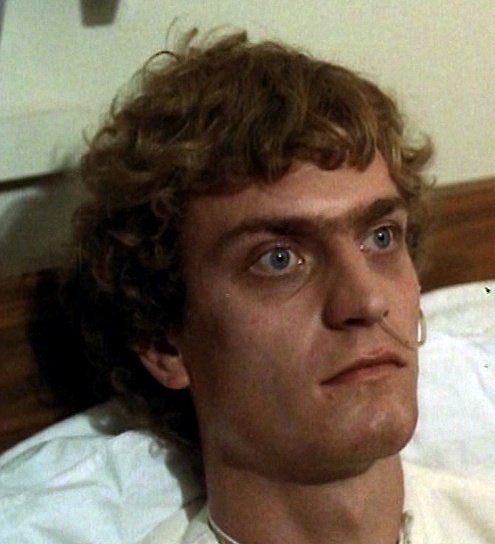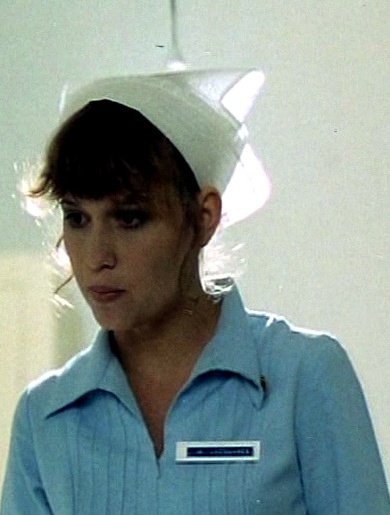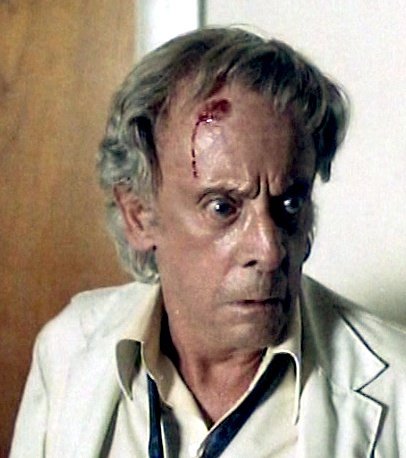PATRICK (1978): Telekinetic Thrills With A Hitchcockian Undertow
The success of Brian DePalma's screen adaptation Carrie sparked a brief wave of telekinesis-themed horror and thriller flicks at the movies and on t.v.: there were Jennifer, The Initiation Of Sarah and The Medusa Touch, to name a few. One of the best films to emerge from this pack was Patrick, a smart, story-driven piece that had its own unique concept and shocks. It's also noteworthy for being the first horror/thriller effort from Richard Franklin, a savvy Hitchcock disciple who would later make the classic Psycho II. Patrick was written by Everett DeRoche, perhaps the best screenwriter of genre fare in Australia during its '70s/'80s commercial heyday. His clever script offers a truly novel villain in the title character (Robert Thompson), who lapsed into a permanent catatonic state after murdering his mother and lover. He's been in a coma for at least three years but is kept alive by Dr. Roget (Robert Helpmann), a doctor with a sinister, clinical bent who sees Patrick as his personal science project.However, the status quo at the clinic changes with the entrance of Kathy (Susan Penhaligon), a nurse on the run from a failing marriage. She treats Patrick with a little kindness and strange things begin to happen. It is soon revealed that Patrick's body might be unconscious but his mind is alive, aware and strong. In his vegetative state, he has developed the power of telekinesis - and he will use it to lash out at anyone who tries to interfere with his attachment to Kathy.Pat
Patrick was written by Everett DeRoche, perhaps the best screenwriter of genre fare in Australia during its '70s/'80s commercial heyday. His clever script offers a truly novel villain in the title character (Robert Thompson), who lapsed into a permanent catatonic state after murdering his mother and lover. He's been in a coma for at least three years but is kept alive by Dr. Roget (Robert Helpmann), a doctor with a sinister, clinical bent who sees Patrick as his personal science project.However, the status quo at the clinic changes with the entrance of Kathy (Susan Penhaligon), a nurse on the run from a failing marriage. She treats Patrick with a little kindness and strange things begin to happen. It is soon revealed that Patrick's body might be unconscious but his mind is alive, aware and strong. In his vegetative state, he has developed the power of telekinesis - and he will use it to lash out at anyone who tries to interfere with his attachment to Kathy.Pat rick stands apart from the Carrie-inspired pack for a few reasons. The first is its ambition: DeRoche's screenplay invests a lot of time in characterization and gives its characters plenty of thoughtful, well-crafted dialogue rather than just focusing on shocks. Franklin avoids pandering to his audience, going for a slow-burn approach that favors suspense over knee-jerk scares and constructing his setpieces with a craftsman's attention to detail. The result might have been inspired by the success of Carrie but it's definitely its own film with its own unique story hooks and rhythms.The one downside of DeRoche and Franklin's approach is that Patrick might be a little too methodical in its approach for some viewers. At nearly two hours in length, it's at least ten minutes longer than it needs to be and this can be felt in the third act, which is reluctant to deliver the kind of fast-paced finale that viewers might be expecting.
rick stands apart from the Carrie-inspired pack for a few reasons. The first is its ambition: DeRoche's screenplay invests a lot of time in characterization and gives its characters plenty of thoughtful, well-crafted dialogue rather than just focusing on shocks. Franklin avoids pandering to his audience, going for a slow-burn approach that favors suspense over knee-jerk scares and constructing his setpieces with a craftsman's attention to detail. The result might have been inspired by the success of Carrie but it's definitely its own film with its own unique story hooks and rhythms.The one downside of DeRoche and Franklin's approach is that Patrick might be a little too methodical in its approach for some viewers. At nearly two hours in length, it's at least ten minutes longer than it needs to be and this can be felt in the third act, which is reluctant to deliver the kind of fast-paced finale that viewers might be expecting.  That said, Franklin's ability to craft a setpiece is impressive throughout and DeRoche supplies plenty of novel setups for these sequences. Memorable moments include the chilling opening that depicts Patrick's crime, a creepy sequence where Patrick communicates with Kathy via an electric typewriter and an impressive extended sequence were a few different characters sneak into Patrick's room around the same time for different reasons. Franklin chooses his shots well, particularly an effective Hitchcockian use of overhead angles, and shows a knack for building suspense without relying on special effects. His major tools are simply camera placement, editing and Brian May's Herrmann-esque film score... and he gets the maximum effect out of that combo.
That said, Franklin's ability to craft a setpiece is impressive throughout and DeRoche supplies plenty of novel setups for these sequences. Memorable moments include the chilling opening that depicts Patrick's crime, a creepy sequence where Patrick communicates with Kathy via an electric typewriter and an impressive extended sequence were a few different characters sneak into Patrick's room around the same time for different reasons. Franklin chooses his shots well, particularly an effective Hitchcockian use of overhead angles, and shows a knack for building suspense without relying on special effects. His major tools are simply camera placement, editing and Brian May's Herrmann-esque film score... and he gets the maximum effect out of that combo. It also helps that Franklin gets strong performances from his cast. DeRoche took pains to populate the film with interesting, adult characters and the actors all clearly respond to this. Penhaligon leads the charge with a committed performance as the heroine, creating a complex, independent-minded protagonist who offers a nice alternative to the usual scream queen archetype.Elsewhere, Helpmann brings a steely intelligence and dark wit to what could have been a generic "bad doctor" character and Helen Hemingway is also memorable as the bitter but very intelligent head of the nursing unit. It's also worth noting that despite being motionless and confined to a bed, Thompson lends a creepy presence to the title role (try not to get a little creeped out when the camera dollies in on his face).In short, Patrick was a promising beginning for Franklin as a suspense maestro. He'd soon reteam with DeRoche for the even-better Road Games before going on to his Hollywood success - and his work here shows the craft-conscious habits that made such success possible.
It also helps that Franklin gets strong performances from his cast. DeRoche took pains to populate the film with interesting, adult characters and the actors all clearly respond to this. Penhaligon leads the charge with a committed performance as the heroine, creating a complex, independent-minded protagonist who offers a nice alternative to the usual scream queen archetype.Elsewhere, Helpmann brings a steely intelligence and dark wit to what could have been a generic "bad doctor" character and Helen Hemingway is also memorable as the bitter but very intelligent head of the nursing unit. It's also worth noting that despite being motionless and confined to a bed, Thompson lends a creepy presence to the title role (try not to get a little creeped out when the camera dollies in on his face).In short, Patrick was a promising beginning for Franklin as a suspense maestro. He'd soon reteam with DeRoche for the even-better Road Games before going on to his Hollywood success - and his work here shows the craft-conscious habits that made such success possible.


